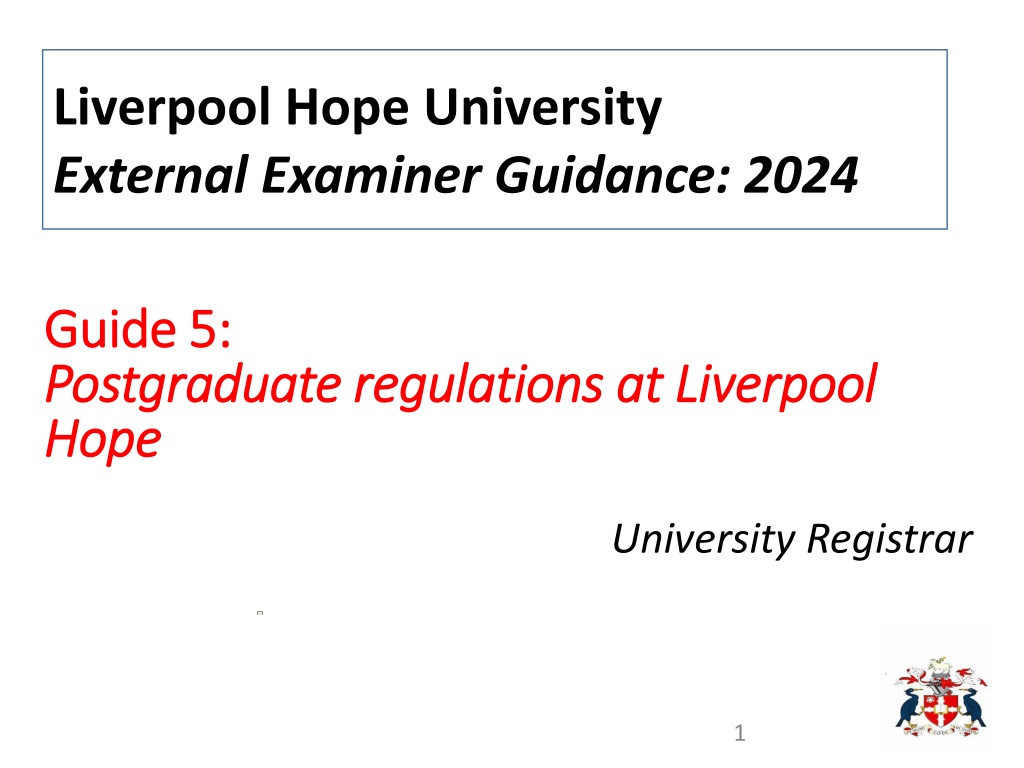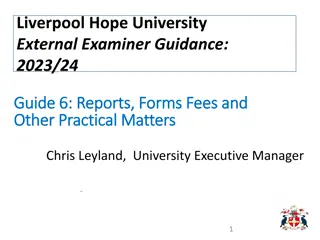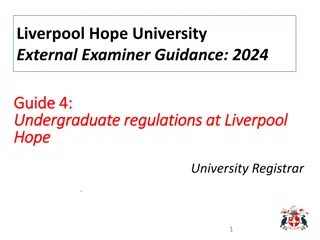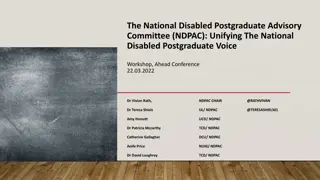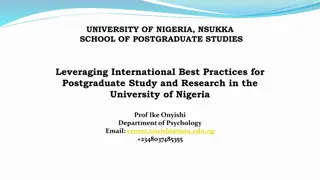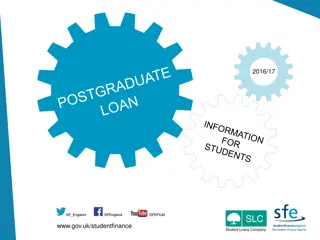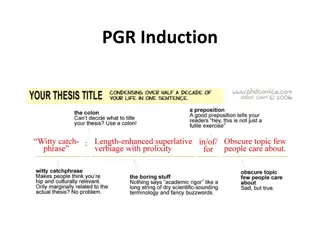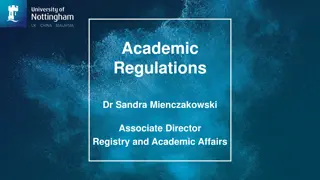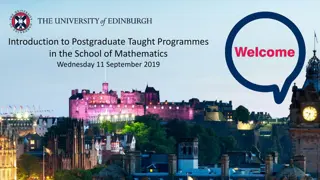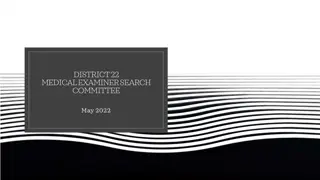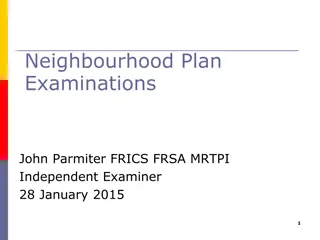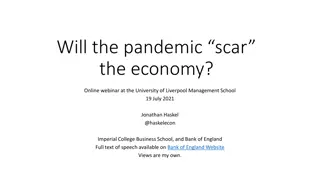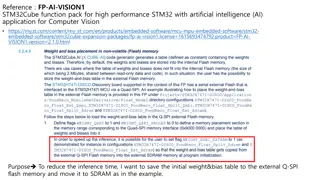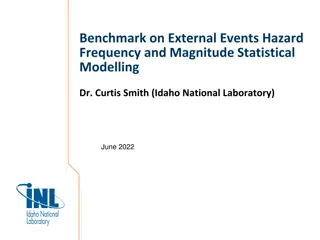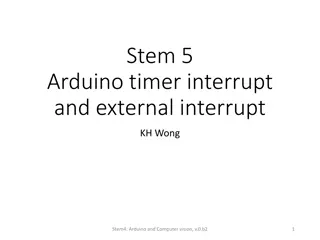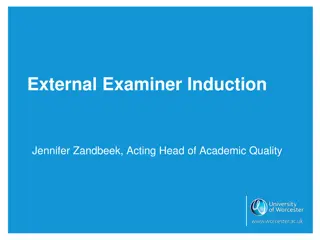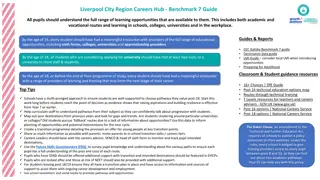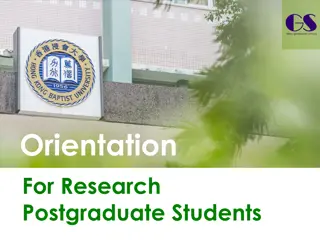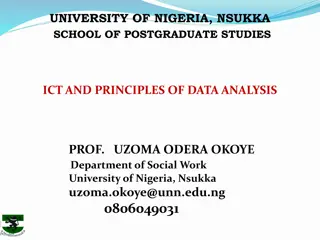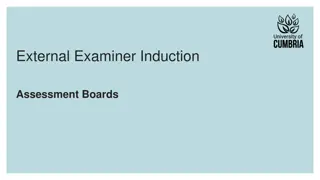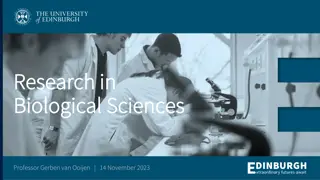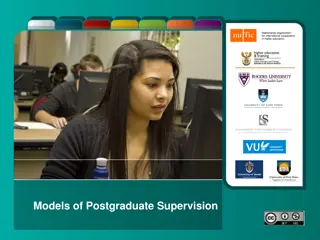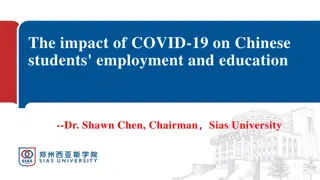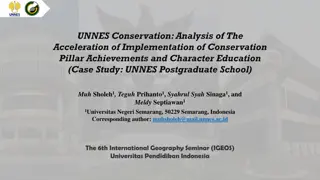Liverpool Hope University External Examiner Guidance 2024 - Postgraduate Regulations Overview
Curriculum structures and program durations for postgraduate degrees at Liverpool Hope University are outlined in the 2024 Guide. The guide details credit requirements for various programs, such as Masters Degrees, PGCEs, Postgraduate Certificates, and Diplomas. It explains the expectations for program durations and extensions for specific courses like MA Social Work and MA Youth and Community Development. The Registrar's role in approving extensions is highlighted throughout the document.
- Liverpool Hope University
- External Examiner Guidance
- Postgraduate Regulations
- Curriculum Structure
- Program Durations
Download Presentation

Please find below an Image/Link to download the presentation.
The content on the website is provided AS IS for your information and personal use only. It may not be sold, licensed, or shared on other websites without obtaining consent from the author. Download presentation by click this link. If you encounter any issues during the download, it is possible that the publisher has removed the file from their server.
E N D
Presentation Transcript
Liverpool Hope University External Examiner Guidance: 2024 Guide Guide 5 5: : Postgraduate regulations at Liverpool Postgraduate regulations at Liverpool Hope Hope University Registrar 1
1. Curriculum Structure (a) Masters Degrees: o Modules to the value of 180 credits. o Students must complete a minimum of 150 credits at Level M[7], 30 credits at Level 6 are allowable. o Three main types: single subject Masters 120 taught credits [normally at least 60 credits core and exclusive ] 60 credits Dissertation [may begin before 120 credits taken or passed]; two-subject Masters 120 taught credits [60 from subject 1 & 60 from subject 2] 60 credits Dissertation integrating the 2 subjects; MEd Professional Practice 180 credits taught modules. 2
1. Indicative Curriculum Structure (b) PGCEs: o Academic module[s] to the value of 60 credits, at Level M[7]. o Professional work and professional practice [not credit-rated]. Postgraduate Certificates: o Modules to the value of 60 credits, at Level M[7]. Postgraduate Diplomas: o Modules to the value of 120 credits, at Level M[7]. The Framework of Qualifications at Hope can be found here 3
2. Duration of Programmes (a) Masters Degrees [except MA Social Work, MW Youth and Community Development and MEd Professional Practice]: o have the following normal expectations 1 year ft or 2 years plus one semester p/t; o End Dates can be extended by Boards of Examiners on the basis of retakes, resubmissions , deferrals or interruptions, exceptional circumstances o the Vice Chancellor needs to approve any further extensions, via the Registrar; 4
2. Duration of Programmes (b) MA Youth and Community Development o has the following normal expectations 16 months full-time; o End Dates can be extended by Boards of Examiners on the basis of retakes, resubmissions , deferrals or interruptions, up to 44 months full-time; o the Vice Chancellor needs to approve any further extension, via the Registrar; MA Social Work: o has the following normal expectations 2 years full-time; o End Dates can be extended by Boards of Examiners on the basis of retakes, resubmissions , deferrals or interruptions, up to 5 years full-time; o the Vice Chancellor needs to approve any further extension, via Registrar; 5
2. Duration of Programmes (c) PGCEs: o have the following normal expectations 1 year full-time; o End Dates can be extended by Boards of Examiners on the basis of retakes, resubmissions , deferrals or interruptions, up to 3 years [but more than 2 is exceptional]; o the Vice Chancellor needs to approve any further extension, via the Registrar. 6
2. Duration of Programmes (e) Postgraduate Diplomas: o have the following normal expectations 2 semesters [or equivalent] full-time; 4 semesters [or equivalent] part-time; Postgraduate Certificates: o have the following normal expectations 1 semester [or equivalent] full-time; 2 semesters [or equivalent] part-time; o End Dates can be extended by Boards of Examiners on the basis of retakes, resubmissions , deferrals or interruptions. o the Vice Chancellor needs to approve any further extension, via the Registrar. 7
3. Pass Marks, Reassessments and Retakes (a) Module Pass Marks: The module pass mark in 50 Reassessment Entitlements: o normally can only be reassessed if module aggregate is 25+; Capping following Reassessment: o Individual assessment mark capped at 50 (C-) for modules starting in 2023/4 and at 54 C for modules beginning earlier. Module aggregate capped at 50 or frozen at its value from initial assessment [whichever is the higher] 8
3. Pass Marks, Reassessments and Retakes (b) Retake Entitlements: o retake normally required if module aggregate was <25 OR module was failed due to academic misconduct; What Students Retake: o normally, EITHER the module they failed OR, if the module was optional, an alternative, to the same credit value a failed alternative is treated in the same way as a failed retake; o retaking a Dissertation means starting a new Dissertation, on a new topic, with supervision. 9
3. Pass Marks, Reassessments and Retakes (c) Capping of Retakes [and Alternative Takes]: o Students will normally receive the full grades earned on merit for individual assessments and for the overall module outcome. o The module may be capped if that was stipulated as part of an academic misconduct outcome. Retake Fees: retake fee charged per module as appropriate. 10
4. Marking Scales and Assessment Descriptors (a) Marking Scale for module registrations from October 2022 Work that has Passed A++ 92 Pass with Distinction A+ 84 Pass with Distinction A 76 Pass with Distinction A- 70 Pass with Distinction B+ 68 Pass with Merit B 60 Pass with Merit B 64 Pass with Merit C+ 58 Pass C 54 Pass C 50 Pass Module aggregate will appear as PD Module aggregate will appear as PD Module aggregate will appear as PD Module aggregate will appear as PD Module aggregate will appear as PM Module aggregate will appear as PM Module aggregate will appear as PM Module aggregate will appear as P Module aggregate will appear as P Module aggregate will appear as P 11
AND Work that has NOT Passed F+ 48 Marginal Fail F 42 Clear Fail F 38 Clear Fail F- 32 Comprehensive Fail F- 22 Comprehensive Fail WF 12 Weak Fail U 2 Unclassified 12
4. Marking Scales and Assessment Descriptors (c) University-wide descriptors available for each grade: o Schools/Departments may adapt the descriptors to include more specific or tailored subject-specific guidance but the University conventions underpin all guidance to students. o This is designed to give consistency across the postgraduate portfolio. 13
5. Award Classification Rules (a) Overview o students are entitled to an award per se if they have enough credits including Accreditation of Prior Learning/Advanced Standing 180 credits including APL/AS entitles them to a Master degree 120 credits including APL/AS entitles them to a PG Diploma 60 credits including APL/AS entitles them to a PG Certificate; o all PGT awards can be made with Merit or Distinction; o eligibility for Merit or Distinction is based solely on modules completed at this University. 14
5. Award Classification Rules (b) Masters Degrees [i]: o Merits & Distinctions only if 120+credits are from Hope; o Distinction mandatory if PD[70+] for overall aggregate; If overall aggregate is within 2 rounded points of the borderline Individual assessments amounting to 50% or more the total credits required for the award are 70% or above 15
5. Award Classification Rules (c) Masters Degrees [ii]: o Merit is mandatory if PM[60+] for overall aggregate. And if overall aggregate is within 2 rounded points of the borderline and Individual assessments amounting to 50% or more of the total credits are 60% or above. 16
5. Award Classification Rules (d) PGCEs [i]: o Academic award based on 60-credit academic module; o QTS recommendation based on 0-credit professional module; o postgraduate award possibly with Merit/Distinction if academic assessments satisfy level M[7] criteria; graduate award if academic assessments reach Level H[6] criteria; o possible outcomes: Postgraduate Certificate with Distinction (with QTS recommendation) Postgraduate Certificate with Distinction (without QTS recommendation) Postgraduate Certificate with Merit (with QTS recommendation) Postgraduate Certificate with Merit (without QTS recommendation) Postgraduate Certificate (with QTS recommendation) Postgraduate Certificate (without QTS recommendation) Professional Graduate Certificate (with QTS recommendation). 17
5. Award Classification Rules (e) PGCEs [ii]: o Distinction is mandatory if: the aggregate academic mark is 70+ ; o Distinction is discretionary [and normally awarded] if: the aggregate academic mark is 68-69 [with at least 50% of assessments 70 or above]; o Merit is mandatory if: the aggregate academic mark is 60+; o Merit is discretionary [and normally awarded] if: the aggregate academic mark is 58-59 [with at least 50% of assessments 60 or above] . 18
5. Award Classification Rules (f) PGDips and PG Certs: o Merits & Distinctions only if 90 credits [PGD]/45 credits [PGC] credits are from Hope. o Distinction mandatory if 70+ for the overall aggregate. Also Distinction if aggregate is 67.5+ & student gets 70+ for 50% of individual assessments. o Merit mandatory if 60+ for the overall aggregate. Also Merit If overall aggregate is 57.5+ & student gets 60+ for 50% of individual assessments. 19
6. Mitigating Circumstances: students who think they are not fit to sit Outline o They should apply for a concession: extension [mark available at the Board]; deferral of assessment [no mark until the next Board M grade shown]; interruption of study; special assessment arrangements / alternative assessments. o Once a concession has been granted, the work is assessed as normal. o Detailed policies on the University s website cover valid grounds, type of evidence required, procedures, and responsibility for granting requests. o Cases should have been dealt with before the Board. Implications for Externals o You are not directly involved, but make sure that the Board seeks an assurance that any M grade has been arrived at via due process. 20
7. Academic Misconduct Outline o Detailed policies on the University s website cover penalties and procedures. o Cases should have been dealt with before the Board. o Cases identified on Board transcripts by PL grades. o Boards accept recommendations as long as due process has been followed. Implications for Externals o Make sure that the Board seeks an assurance that any PL has been arrived at via due process. o If you suspect misconduct, notify the Assessment Co-ordinator asap, and ask for the matter to be investigated by due process. 21
8. What will Board Transcripts look like? Issued electronically no later than the day before the Board; 22
9. Some Implications for Externals (a) Masters Degrees o pay particular attention to Dissertations and Research Projects; o for fails, make sure that - work below F+ is too poor to be compensated, module aggregates below 25 reflect performance too poor to warrant a reassessment; o for passes, make sure you are confident about the Pass/Merit/Distinction category awarded for each assessment - Individual assessment outcomes aggregate to give the module mark which can have a significant effect should the students overall award profile be classed as borderline . 23
9. Some Implications for Externals (b) PGCEs [academic credits]: o make sure you are confident about the broad level of a student s achievement: pass at level M[7], pass at level H[6], below pass standard at Level H[6]; o for fails, make sure that - work below F+ is too poor to be compensated, module aggregates below 25 reflect performance too poor to warrant a reassessment; o for passes, make sure you are confident about the Pass/Merit/Distinction category given to each assessment. 24
9. And finally We hope you have found this presentation useful. If you have any queries please email Dr Cathy Walsh [University Registrar] at walshc@hope.ac.uk 25
